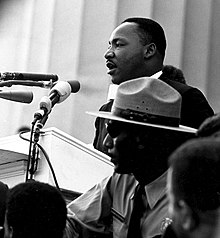„I Have a Dream“ – Versionsunterschied
| [gesichtete Version] | [ungesichtete Version] |
Änderung 118993344 von 84.187.35.125 rückgängig gemacht; nö, schon korrekt so |
|||
| Zeile 12: | Zeile 12: | ||
''I have a dream that one day on the red hills of Georgia the sons of former slaves and the sons of former slave owners will be able to sit down together at a table of brotherhood.''<br /> |
''I have a dream that one day on the red hills of Georgia the sons of former slaves and the sons of former slave owners will be able to sit down together at a table of brotherhood.''<br /> |
||
''I have a dream that one day even the state of Mississippi, a state sweltering with the heat of injustice and sweltering with the heat of oppression, will be transformed into an oasis of freedom and justice.''<br /> |
''I have a dream that one day even the state of Mississippi, a state sweltering with the heat of injustice and sweltering with the heat of oppression, will be transformed into an oasis of freedom and justice.''<br /> |
||
''I have a dream that my four little children |
''I have a dream that my four little children wil |
||
OAVJBÖOAJFOPNHhere they will not be judged by the color of their skin but by the content of their character.''<br /> |
|||
''I have a dream today!''}} |
''I have a dream today!''}}wetklklöerJOÖE$JOÖEWTJOÖ§TRRJZOEFJÖYA<FOÖORAJoöRJg |
||
'''Übersetzung in das Deutsche''': |
'''Übersetzung in das Deutsche''': |
||
Version vom 3. Juni 2013, 08:52 Uhr

I Have a Dream (engl. „Ich habe einen Traum“) ist der Titel einer berühmten Rede von Martin Luther King, die er anlässlich des Marsches auf Washington für Arbeit und Freiheit, an dem mehr als 250.000 Menschen teilnahmen, am 28. August 1963 in Washington D.C. vor dem Lincoln Memorial hielt.
I Have a Dream war eine der wichtigsten Ansprachen während des Marsches der Bürgerrechtsbewegung nach Washington für Arbeitsplätze, Freiheit und Gleichheit, speziell für die afroamerikanische Bevölkerung der USA. Dieser Marsch war initiiert von sechs Menschenrechtsorganisationen, die The Big Six genannt wurden. Darunter war auch die Southern Christian Leadership Conference (SCLC), deren Vorsitzender Martin Luther King war. King benutzte seine Rede als negative Hommage auf den geplatzten bzw. für manche – wie beispielsweise die afroamerikanische Bevölkerung der USA – unerreichbaren American Dream, um damit auf die Missstände der Situation der schwarzen Bevölkerung aufmerksam zu machen.
Die Rede wird zu den Meisterwerken der Rhetorik gezählt. King verwendet darin als Allusionen Exzerpte aus der Bibel, der Unabhängigkeitserklärung der Vereinigten Staaten, der US-Verfassung, der Erklärung zur Sklavenemanzipation und der Gettysburg-Note, beide von Präsident Lincoln. Durch die Verwendung von Anaphern und die getragene Vortragsweise wirkt die Rede zudem wie eine typische methodistische Predigt.
Auszug aus der Rede
I have a dream that one day this nation will rise up, and live out the true meaning of its creed: ‘We hold these truths to be self-evident: that all men are created equal.’
I have a dream that one day on the red hills of Georgia the sons of former slaves and the sons of former slave owners will be able to sit down together at a table of brotherhood.
I have a dream that one day even the state of Mississippi, a state sweltering with the heat of injustice and sweltering with the heat of oppression, will be transformed into an oasis of freedom and justice.
I have a dream that my four little children wil
OAVJBÖOAJFOPNHhere they will not be judged by the color of their skin but by the content of their character.
I have a dream today!
wetklklöerJOÖE$JOÖEWTJOÖ§TRRJZOEFJÖYA<FOÖORAJoöRJg
Übersetzung in das Deutsche: Vorlage:Zitat-de
-
Demonstranten am Lincoln Memorial während der Rede
-
Denkmal für Martin Luther King
-
Martin Luther King kurz nach seiner Rede
Weblinks
- Die Rede als Text, Sound und Video (gekürzte Fassung)
- Die Rede auf Deutsch
- Die Rede auf Englisch
- Martin Luther King, Jr. "I have a dream" Full speech (1963 Washington) auf Myvideo (Video, etwa 17 Min., Englisch)
- Martin Luther King, Jr. "I have a dream" Full speech (1963 Washington) auf Youtube (Video, etwa 17 Min., mit Untertiteln auf Englisch)


